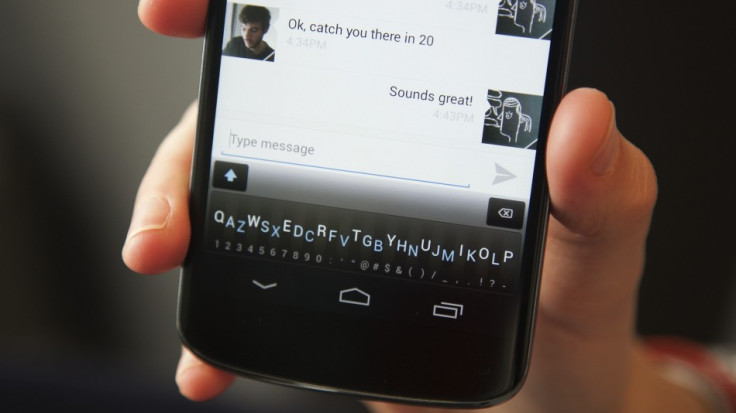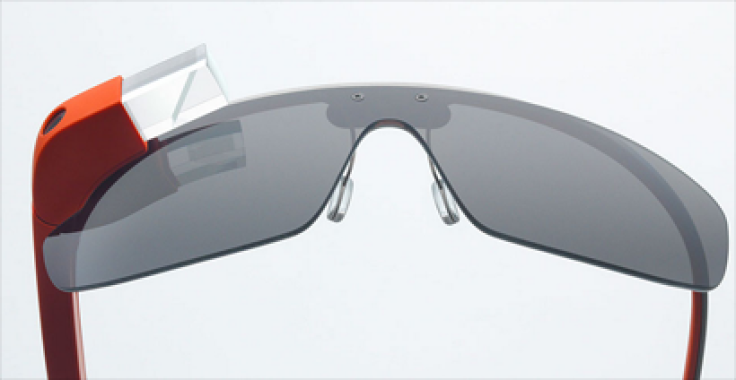Minuum: The Smart Keyboard With Google Glass in its Sights [VIDEO]
If Google wants to get typing right with Glass then it should look no further than Minuum, the Toronto-based start-up developing a revolutionary new keyboard that can be used almost anywhere.

Headed by Will Walmsley, 23, and a product of the MaRS start-up accelerator in Toronto, Canada, the Minuum team set about creating a new way of typing.
Called linear typing, Minuum takes the standard Qwerty layout and squashes it down so that the letters are in an almost straight line with small variances in height, so the three rows of letters are only slightly below each other, rather than stacked vertically.
For smartphones and tablets where screen space is at a premium this means more of the display is left visible, but uses for Minuum go much further than mere space saving.
"There are many ways you could make use of eye-tracking to allow the eye to type," Walmsley tells IBTimes UK. "But probably more interesting is that there's a camera in Google Glass, so with some very simple image processing you could infer the movement of someone's hand or finger in front of the person using that camera to feedback."
Essentially, a wearer of Google Glass could type on any template resembling the condensed Minuum keyboard. This could be printed on a cleaning cloth or case for the glasses, for example, and Glass's camera would interpret their actions into text inputs.
Muscle memory
As for learning how to type with Minuum's condensed layout, Walmsley assures us that any user's current muscle memory will be enough, and mistakes will be corrected by the software.
"We wanted to make sure the keyboard was immediately satisfying to pick up. We tried different arrangements of letters but we found that using this minimised Qwerty keyboard was better.
"The ways the letters are shown allows you to use your muscle memory from normal typing, you should be able to pick up the keyboard and use it straight away. There's some learning that occurs [by the keyboard] as you use it so you become faster and more precise the more you use it."
Following an initial two-year testing period which looked more broadly at how typing on a range of devices could be made better, along with funding from the MaRS Innovative and University of Toronto, Minuum will be released as a beta to Indiegogo investors and the press in June.
By then, Walmsley hopes the keyboard will be right 99 percent of the time, and successfully offer the correct word from a list of options for the remaining one percent.
Minuum can also be used to accurately enter passwords or words its autocorrect software isn't familiar with. Press and hold on a key, and that area magnifies to let you easily select the exact letter, number or punctuation mark you need - similar to how accents are found on an iPhone keyboard.
With a week still to run, Minuum's Indiegogo campaign has raised $80,000 (£52,000), far greater than its original $10,000 target.
"Pretty much all of it is going towards software development," Walmsley tells us. "It may sound less interesting than other projects saying 'we'll be building this and this', but when it comes to software development it's all about hiring people to put the time into making it better."
Walmsley expects to hire two new developers to join the five-person team, and has plans to grow further once Minuum is available on the Google Play Store in early 2014, where it will work with Android devices from version 2.3 onwards.

Google Glass
Beyond an Android app, Walmsley hopes licensing Minuum to hardware manufacturers will be the company's future. "Google Glass is definitely something we're looking at. We haven't been able to make any deals yet, but we've started to talk to a number of manufacturers of different sizes.
"Our goal is never to be a hardware company. Because we have this technology that has the potential to create such a splash, we want to license it to manufacturers. We want to get this everywhere and for this to become the next way to type."
Although there are dozens of keyboards available for Android, the Minuum team doesn't see it having any direct competition, and believes its closest rival is voice recognition, as used by Google Glass. But with obvious limitations like understanding accents and colloquial language, and being used in public, voice isn't an ideal solution for interacting with wearable tech.
"In most wearable devices I've seen people have either simply removed typing entirely or are expecting to rely on voice, as is the case with Google Glass. Our keyboard is clearly something over what they have, because they're not expecting you to type at all," Walmsley reasons.
When asked if he would consider selling Minuum to Google or Apple, the 23-year-old defended his company, but remained open-minded: "That's really not something we want to have happen. I'm not going to say that that's outside the realm of possibility, but that's not our goal right now."
For now, Minuum is a clever, space-saving keyboard for Android, but a year down the road when smart watches and Glass arrive it could well become the way to interact with wearable tech.
© Copyright IBTimes 2024. All rights reserved.






